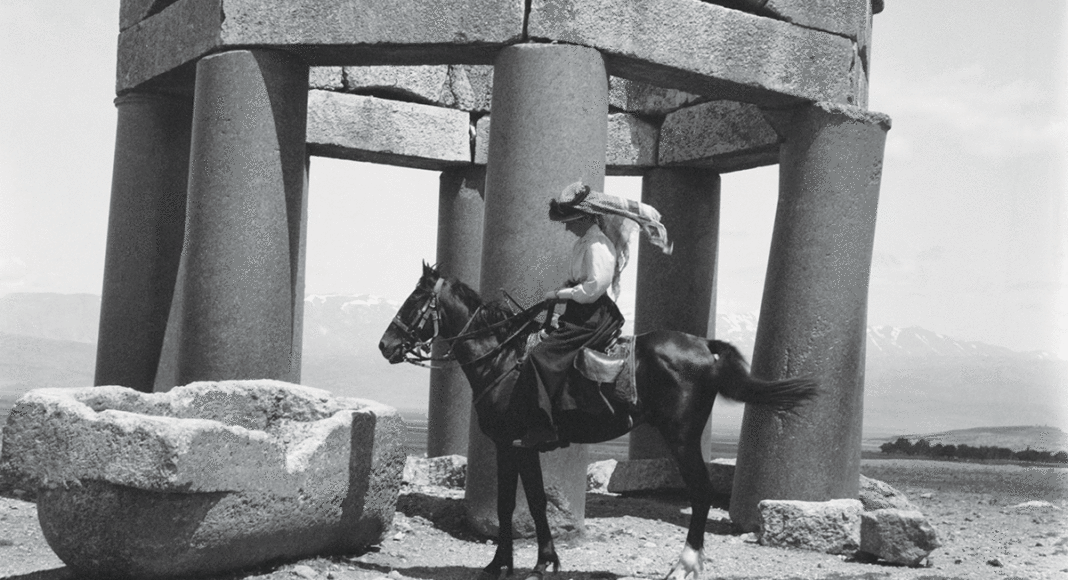Calling all uppity women! If you’re looking for a role model on how to defy the rules and live the life you choose, look no further than Gertrude Bell. Born into a genteel English Victorian family, she carved out her own destiny as historian, traveler, mountain-climber, archeologist, map-maker, author, intelligence operator, and renowned expert on the peoples and politics of the area we now call the Middle East. In her day—the turn of the last century, through World War I and its aftermath—she was known as “the female Lawrence of Arabia.”
The story of Gertrude Lowthian Bell is told in fascinating terms in Letters From Baghdad. Co-directed by Sabine Krayenbuhl and Zeva Oelbaum, this documentary relies on a lifetime of letters and journal entries in which Bell tells her own story as she lived it, with her own words spoken by the film’s co-producer, Tilda Swinton. The filmmakers also present a treasure trove of Bell’s own photographs, snapped during her adventures to exotic locales like the Alps, Tehran, Babylon, Damascus, and Constantinople (among many other places).
In addition to Bell’s personal photographs, the filmmakers use lots of newsreel footage from the era, along with still photos of Bell and her circle. These were mostly British politicians and governors stationed in the area (many of them refer to Bell as their “right-hand man”), among whom Bell established a reputation for her vast experience with the peoples, cultures, and even the language of “Arabia”—and with whom she helped shape the political realities of the region after WWI and the collapse of the Ottoman Empire.
Bell emerges as a strong-minded woman constantly tilting against convention and expectation. After taking a First in History in her class at Oxford, she’s shipped off to “the East” by her stepmother, in hopes that exposure to foreign society “might help to get rid of her Oxford-y manner.” (Actors portraying Bell’s various friends, family, and colleagues, filmed in black-and-white, are “interviewed” on screen, speaking words written about Bell by those who knew her.)
After a broken engagement and much more travel, Bell writes a book about Syria, expressing her opposition to the Ottoman Empire. Determined to “penetrate Arabia” by making maps and studying artifacts, Bell lands in Cairo in 1915, working in Intelligence with T. E. Lawrence and archeologist David Hogarth. She was “a wonderful person,” to quote Lawrence in one of the faux interviews. “Not very much like a woman,” he adds. Finding much more common ground with the men in the British diplomatic and political circles she moves in than with their wives, Bell writes to her father back home about how she would have liked the convenience of a wife to keep house for her.
Valued for her extensive knowledge of “inter-tribal relationships,” Bell’s influence reaches its zenith when she’s enlisted to help divide postwar “Arabia” between the British, the French, and the Turks. As explained in the film’s prologue, “The stage was set a century ago for the wars and sectarianism now tearing apart the Middle East.” It becomes Bell’s dubious task to go against four thousand years of history and tradition to try to draw Iraq on a map as a new “political state.”
Ultimately, Bell is disillusioned by the failure after the war to establish an autonomous Arabian state of Mesopotamia; instead, Britain chooses to continue its occupation of the region. (They don’t call themselves conquerors, but “liberators”—and, boy, does that sound familiar.) The Brits’ general cluelessness about governing the region, coupled with their relentless profiteering, is further complicated by the presence of Standard Oil, rearing its reptilian head in collusion with disgruntled Arab rebels in hopes of wresting away oil rights for the U.S.
The thorny issue of how to govern Iraq (and who has the right to do it) continues to play out on the world stage. Letters From Baghdad does not presume to offer any solutions. But it does offer an impressive portrait of a singular woman of her own—or any other—time.
LETTERS FROM BAGHDAD
*** (out of four)
Featuring the voice of Tilda Swinton. A documentary by Zeva Oelbaum and Sabine Krayenbuhl. A Vitagraph Films release. Not rated. 95 minutes.













